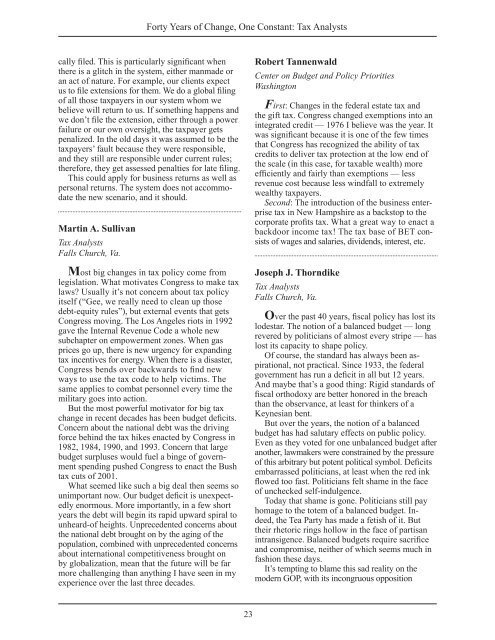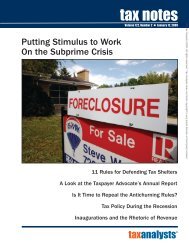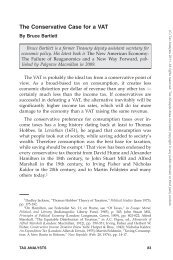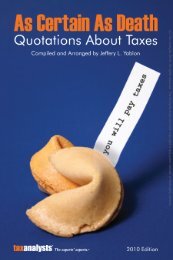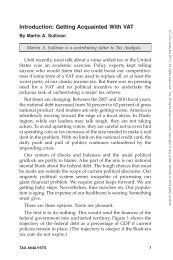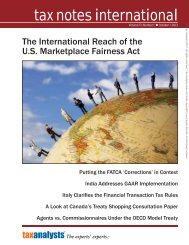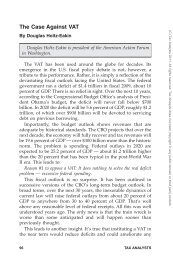Forty Years of Change, One Constant: Tax Analysts
Forty Years of Change, One Constant: Tax Analysts
Forty Years of Change, One Constant: Tax Analysts
You also want an ePaper? Increase the reach of your titles
YUMPU automatically turns print PDFs into web optimized ePapers that Google loves.
<strong>Forty</strong> <strong>Years</strong> <strong>of</strong> <strong>Change</strong>, <strong>One</strong> <strong>Constant</strong>: <strong>Tax</strong> <strong>Analysts</strong><br />
cally filed. This is particularly significant when<br />
there is a glitch in the system, either manmade or<br />
an act <strong>of</strong> nature. For example, our clients expect<br />
us to file extensions for them. We do a global filing<br />
<strong>of</strong> all those taxpayers in our system whom we<br />
believe will return to us. If something happens and<br />
we don’t file the extension, either through a power<br />
failure or our own oversight, the taxpayer gets<br />
penalized. In the old days it was assumed to be the<br />
taxpayers’ fault because they were responsible,<br />
and they still are responsible under current rules;<br />
therefore, they get assessed penalties for late filing.<br />
This could apply for business returns as well as<br />
personal returns. The system does not accommodate<br />
the new scenario, and it should.<br />
Martin A. Sullivan<br />
<strong>Tax</strong> <strong>Analysts</strong><br />
Falls Church, Va.<br />
Most big changes in tax policy come from<br />
legislation. What motivates Congress to make tax<br />
laws? Usually it’s not concern about tax policy<br />
itself (“Gee, we really need to clean up those<br />
debt-equity rules”), but external events that gets<br />
Congress moving. The Los Angeles riots in 1992<br />
gave the Internal Revenue Code a whole new<br />
subchapter on empowerment zones. When gas<br />
prices go up, there is new urgency for expanding<br />
tax incentives for energy. When there is a disaster,<br />
Congress bends over backwards to find new<br />
ways to use the tax code to help victims. The<br />
same applies to combat personnel every time the<br />
military goes into action.<br />
But the most powerful motivator for big tax<br />
change in recent decades has been budget deficits.<br />
Concern about the national debt was the driving<br />
force behind the tax hikes enacted by Congress in<br />
1982, 1984, 1990, and 1993. Concern that large<br />
budget surpluses would fuel a binge <strong>of</strong> government<br />
spending pushed Congress to enact the Bush<br />
tax cuts <strong>of</strong> 2001.<br />
What seemed like such a big deal then seems so<br />
unimportant now. Our budget deficit is unexpectedly<br />
enormous. More importantly, in a few short<br />
years the debt will begin its rapid upward spiral to<br />
unheard-<strong>of</strong> heights. Unprecedented concerns about<br />
the national debt brought on by the aging <strong>of</strong> the<br />
population, combined with unprecedented concerns<br />
about international competitiveness brought on<br />
by globalization, mean that the future will be far<br />
more challenging than anything I have seen in my<br />
experience over the last three decades.<br />
Robert Tannenwald<br />
Center on Budget and Policy Priorities<br />
Washington<br />
First: <strong>Change</strong>s in the federal estate tax and<br />
the gift tax. Congress changed exemptions into an<br />
integrated credit — 1976 I believe was the year. It<br />
was significant because it is one <strong>of</strong> the few times<br />
that Congress has recognized the ability <strong>of</strong> tax<br />
credits to deliver tax protection at the low end <strong>of</strong><br />
the scale (in this case, for taxable wealth) more<br />
efficiently and fairly than exemptions — less<br />
revenue cost because less windfall to extremely<br />
wealthy taxpayers.<br />
Second: The introduction <strong>of</strong> the business enterprise<br />
tax in New Hampshire as a backstop to the<br />
corporate pr<strong>of</strong>its tax. What a great way to enact a<br />
backdoor income tax! The tax base <strong>of</strong> BET consists<br />
<strong>of</strong> wages and salaries, dividends, interest, etc.<br />
Joseph J. Thorndike<br />
<strong>Tax</strong> <strong>Analysts</strong><br />
Falls Church, Va.<br />
Over the past 40 years, fiscal policy has lost its<br />
lodestar. The notion <strong>of</strong> a balanced budget — long<br />
revered by politicians <strong>of</strong> almost every stripe — has<br />
lost its capacity to shape policy.<br />
Of course, the standard has always been aspirational,<br />
not practical. Since 1933, the federal<br />
government has run a deficit in all but 12 years.<br />
And maybe that’s a good thing: Rigid standards <strong>of</strong><br />
fiscal orthodoxy are better honored in the breach<br />
than the observance, at least for thinkers <strong>of</strong> a<br />
Keynesian bent.<br />
But over the years, the notion <strong>of</strong> a balanced<br />
budget has had salutary effects on public policy.<br />
Even as they voted for one unbalanced budget after<br />
another, lawmakers were constrained by the pressure<br />
<strong>of</strong> this arbitrary but potent political symbol. Deficits<br />
embarrassed politicians, at least when the red ink<br />
flowed too fast. Politicians felt shame in the face<br />
<strong>of</strong> unchecked self-indulgence.<br />
Today that shame is gone. Politicians still pay<br />
homage to the totem <strong>of</strong> a balanced budget. Indeed,<br />
the Tea Party has made a fetish <strong>of</strong> it. But<br />
their rhetoric rings hollow in the face <strong>of</strong> partisan<br />
intransigence. Balanced budgets require sacrifice<br />
and compromise, neither <strong>of</strong> which seems much in<br />
fashion these days.<br />
It’s tempting to blame this sad reality on the<br />
modern GOP, with its incongruous opposition<br />
23


